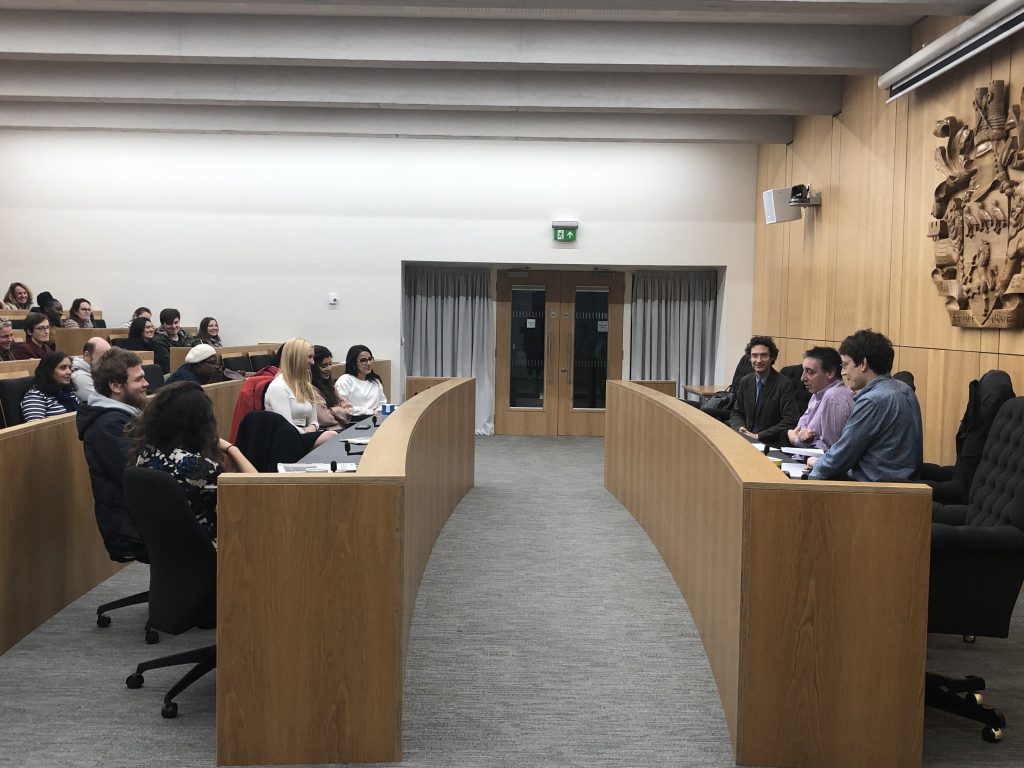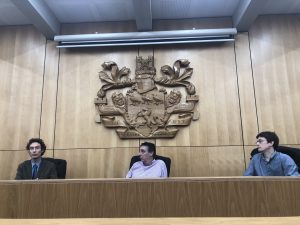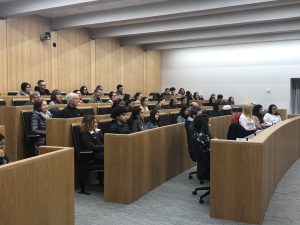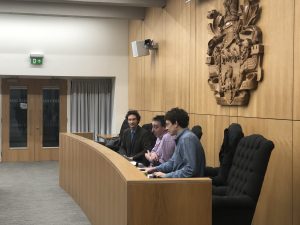On Friday 30 November, Kent Law Clinic hosted an informed, civilised and passionate debate on the issue of our time.
Dr Anthony Valcke, founder and supervisor of the EU Rights Clinic at the University of Kent in Brussels, and Graham Tegg, Director of Kent Law Clinic, presented their analyses of what Brexit might mean for citizens of the UK and of the 27 EU Member States who have free moved. Dr Valcke is a qualified solicitor in England and a member of the Brussels and Palermo bars. Graham is a specialist in EU rights and welfare benefits and responsible for a number of leading cases in the Court of Justice of the European Union (CJEU).
The debate represented a notable, if not unique, moment of calm. The speakers gave clear presentations of their understanding of the current legal rights of EU and British citizens. Then, through the lens of examining the implications of Brexit for the future of citizens’ rights, each speaker presented sharp, and sharply different, critiques of the European Union itself and of the potential benefits and costs of Brexit.
Valcke, a passionate supporter of the EU project, and a supporter of the UK remaining in the UK, did not hesitate to agree with many of Tegg’s criticisms of the EU itself, and of Theresa May’s current proposals as they affect EU citizens and their families in the UK, and British citizens living elsewhere in the EU. He explained that though the rights of EU citizens and their families currently in the UK are to be protected by the UK government, (amounting to an ‘amnesty’ in Valcke’s view), the proposals exclude so-called ‘Surinder Singh’ families – British citizens currently working in the EU who wish to bring third-country family members back with them. Neither do the proposals contain any promises to UK citizens currently working in the EU: but we know that in Valcke’s phrase they will be ‘landlocked’ in the EU country in which they currently reside. And their onward rights will be subject to the immigration and nationality laws of that member state. Valcke accepted many of the broader criticisms of the EU as a structure and as a project, such as limitations in the content of citizens’ rights and the ‘democratic deficit’, but staunchly maintains that reform would still be easier if the UK were to remain inside the EU.
Tegg began with a critique of the EU’s conception of ‘EU citizenship’ as introduced (in response to no popular demand) by the Maastricht Treaty in 1992. True citizens’ rights must require no distinctions on any grounds between those accepted as citizens of a given territory. This means the unfettered right to enter and remain in the whole territory, including rights to vote, to work, study, claim benefits, etc. However, ‘EU citizenship’ has never approached that universal understanding. From the beginning the concept of free movement has been constrained by economic considerations, so that effectively only those who are useful and valuable to the EU economy enjoy free movement, and even they enjoy very limited democratic rights in the host Member States. Tegg described the experiences of EU national Clinic clients, some resident in the UK for decades, who face destitution because of the restrictive interpretation of free movement laws – in his view demonstrating that ‘EU citizenship’ was never envisaged as applying to the poor, or those who lost their jobs, or became sick, or who simply made poor life choices. At the very moment when such people need support, the EU abandons them. Valcke disagreed with Tegg’s criticism of the CJEU’s role in restricting free movement rights, laying the blame with right-wing neoliberal government (foremost being the UK under Thatcher, which from the early 90’s campaigned strongly against ‘benefits tourism’).
However, Tegg used his critique of ‘EU citizenship’ to develop his broader argument for ‘better out than in’. For Tegg, the EU as a structure and as a project is destructive of the social or welfare state, leaving those wishing to defend people’s social rights and entitlements to judicial activism instead of political discussion and political action. He concluded by emphasising the importance of democracy – that we are governed by those we elect, on the basis of the fullest possible debate – and thus we cannot hand over major decisions about citizens’ rights, or any other matter, to distant bureaucratic institutions which prioritise economic interests and do not have the interests of people at heart.
Both speakers were clear, informative, courteous and entertaining, and received deserved applause. The questions from the floor were well thought out and imaginative, and the answers illuminating. Afterwards one member of the audience said they had so far “despaired” of the Brexit debate occurring in the media and was very pleased to attend a debate where the facts were discussed sensibly and reasonably.’ It was a treat, a privilege to be present at an event where people disagreed but spoke not across one another but to and with each other.
In the Kent Law Clinic we endeavour to create and sustain a space where people feel able to debate legal, political, social, cultural issues, where all opinions can be analysed and challenged. We will be holding more ‘Brexit debates’ – watch out for them!
Sheona York, Kent Law Clinic Solicitor




